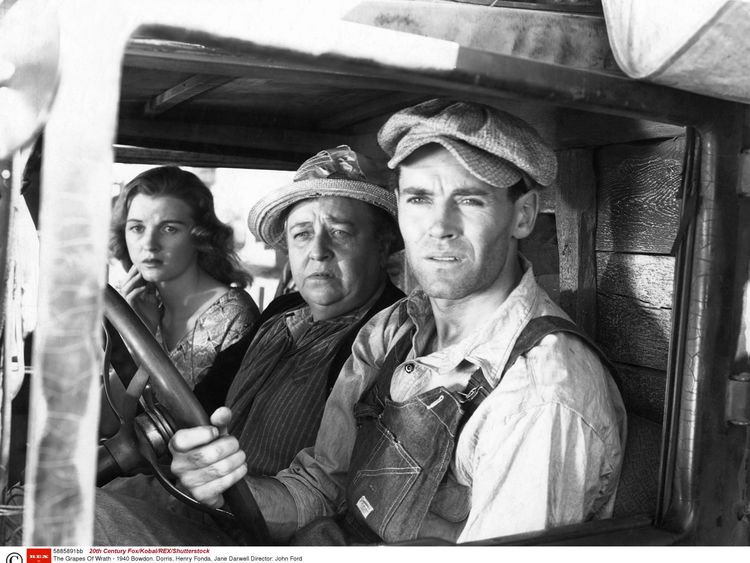Can books by Nobel winners become good films?
This year’s winner of the Nobel Prize for Literature has seen his two biggest works made into two very different films.
Kazuo Ishiguro has received what is considered to be the most important literary honour in the world, but Hollywood noticed the British author way before the Swedish Academy did.
In 1993, director James Ivory turned Ishiguro’s most famous work into a film starring Anthony Hopkins and Emma Thompson.
You will probably remember the film and likely know very little about its author – such is the nature of literature – but, when the film was shot, Ishiguro had already been awarded the Booker Prize for it.
The Remains Of The Day, the story of an emotionally detached butler serving the masters of World War II, is a subtle, brilliantly interpreted film which successfully delivers a novel which many deemed unfilmable.
The same, however, can’t be said about his second most famous work: the dystopian youth tale Never Let Me Go.
Similar in tone and temper, the two novels are radically different in topic and big screen success.
:: British writer Kazuo Ishiguro wins Nobel Prize for Literature
Set in the future, Never Let Me Go is the story of three friends in a boarding school who are afraid of the woods outside.
In the film adaptation, they are played by Carey Mulligan, Keira Knightley and Andrew Garfield.
While Knightley was already a famous name at the time, the other two were just starting their careers.
The film was directed by the less-than-prolific Mark Romanek, a film-maker whose works have always fared far from brilliance.
The script was adapted by Alex Garland, the author who penned The Beach and who has lately evolved into directing himself.
It’s a terrible film – and one which doesn’t do justice to the novel because, ultimately, it doesn’t understand it.
In the book, Ishiguro tells a sci-fi story of clones to hide his favourite topic: the fear of failure.
As with the butler in The Remains Of The Day, the three children of Never Let Me Go are ultimately confronted with the realisation of a missed purpose in life.
Like the butler before them, they wish things had been different.
The film misses the source work’s message, as so many of them do.
Over the years, many films have spawned from literary classics.
From John Ford’s visceral left-wing triumph The Grapes Of Wrath to Denis Villeneuve’s strange, distorted Enemy, directors have used Nobel books to either pay homage to them, or shape them in their image.
Ford’s take on Steinbeck’s magnum opus is by far one of the best and more curious ones.
Unlike Steinbeck, Ford was known for his right-wing leanings, and his films have often reflected that.
This balance between the screaming idealism of the author and the moderate tone of the director create a film which is more about characters than it is about message.
The same can be said about Villeneuve’s Enemy, based on Jose Saramago’s novel The Duplicated Man, winner of 1998’s Nobel Prize.
Starring Jake Gyllenhaal as both a man and his evil doppelganger, the film offers a different ending than the one given in Saramago’s novel. Again, the film-maker adds value to the book.
This is a recurrent theme. In the 2009 film The Watchmen, director Zack Snyder famously chickened out of ending the film with a giant creature destroying New York and opted for a more sombre ending instead.
But what failed in Snyder’s adaptation of Alan Moore’s celebrated graphic novel worked perfectly for Villeneuve.
The film received rave reviews, and its disturbing and highly interpretative ending feels like a step ahead of Saramago’s modern classic.
But not all Nobel Prize winners have had the same luck with their Hollywood adaptations.
In 2008, South African novelist J M Coetzee saw one of his most celebrated novels, Disgrace, be butchered by director Steve Jacobs who failed to capture Coetzee’s calm anger – the one you’d expect from someone who lived through apartheid.
In the subject of great works of literature being adapted to film, it’s always hit and miss – but sometimes, there comes a director whose love for the original work is so deep that the film plays out like an homage to it.
When that happens, everyone wins.
You may be interested

Avengers Secret Wars leak: 'Huge Marvel star returning for multiple multiverse projects'
admin - Apr 26, 2024[ad_1] It’s been five years since Avengers Endgame and the conclusion of the MCU’s Infinity Saga.The on-going Multiverse Saga continues…

Queen Maxima looks elegant in red dress – £69 M&S alternative 'flatters fuller figures'
admin - Apr 26, 2024[ad_1] Royal fans were blown away with Queen Maxima's elegant and chic fashion choices. "Wow!" Sarah Kay posted to the…

Challengers ending explained after cryptic post from Zendaya ‘If you know you know’
admin - Apr 26, 2024[ad_1] Warning - the following article contains major spoilers for ChallengersChallengers is finally releasing this weekend, and a cryptic post…
Leave a Comment
You must be logged in to post a comment.




























